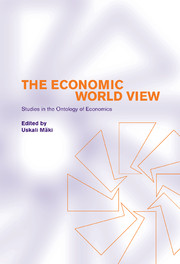Book contents
- Frontmatter
- Contents
- Notes on the contributors
- Preface
- I The what, why, and how of economic ontology
- II Rationality and homo economicus
- Part III Micro, macro, and markets
- Part IV The world of economic causes
- 14 Ceteris paribus laws and socio-economic machines
- 15 Tendencies, laws, and the composition of economic causes
- 16 Economics without mechanism
- Part V Methodological implications of economic ontology
- Name index
- Subject index
16 - Economics without mechanism
Published online by Cambridge University Press: 04 August 2010
- Frontmatter
- Contents
- Notes on the contributors
- Preface
- I The what, why, and how of economic ontology
- II Rationality and homo economicus
- Part III Micro, macro, and markets
- Part IV The world of economic causes
- 14 Ceteris paribus laws and socio-economic machines
- 15 Tendencies, laws, and the composition of economic causes
- 16 Economics without mechanism
- Part V Methodological implications of economic ontology
- Name index
- Subject index
Summary
Mechanism
A standard and natural approach to the metaphysics of economics is to start with a careful scrutiny of economic theory and practice, or some suitable part thereof, and decide what metaphysical picture is implied by, or presupposed by, or most consistent with this theory and practice. My approach in this paper will be rather different. I shall start by presenting and motivating some broad metaphysical ideas, and then discuss the question how economics would look in the light of those ideas. The rationale for this methodology is as follows. Economics has developed in the context of a broad set of metaphysical assumptions that have existed in parallel with the last four hundred years of science. Although the metaphysical picture in question has primarily been developed in relation to the physical sciences, it has been of fundamental importance in the development of economics. In a research program carried out over a number of years and culminating in my book, The Disorder of Things (1993), I have developed a broad critique of this metaphysical picture. An obvious sequel to this project is an examination of the implications of the rejection of this picture for various areas of science. Economics is an especially appropriate candidate for such an examination because its high status among the social sciences derives, arguably, precisely from the extent to which its practice reveals a commitment to this classical metaphysics.
In The Disorder of Things I referred most generally to this classical metaphysics as mechanism. Mechanism, of course, is a doctrine that has something to do with machines – in fact I have come to believe that the connections with machines are deeper and more interesting than I I had appreciated when I wrote the book.
- Type
- Chapter
- Information
- The Economic World ViewStudies in the Ontology of Economics, pp. 308 - 332Publisher: Cambridge University PressPrint publication year: 2001
- 6
- Cited by



